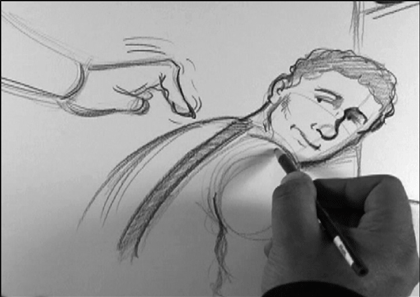By Bonnie Rosenstock
In five short years Ellie Diez has gone from making mojitos to making movie magic. In 2002, Diez, a thirty-something, hazel-eyed Latina of Puerto Rican and Ecuadorian extraction, was working as a bartender at Esperanto, a fusion Latino restaurant. One of the owners, Stephan Gervaille Reache, got permission to present an event in La Plaza Cultural Community Garden on 9th Street and Avenue C, across from his restaurant, and asked his staff to create something wonderful for the Loisaida neighborhood. Thus was born the Loisaida Cortos [short films] International Latino Film Festival, which Diez and five co-workers founded. “Since I’ve been acting for a long time and have a lot of friends who are musicians and artists and was the only one from New York, it was very easy to go to them and ask if they knew any filmmakers,” Diez related.
For Diez, a native New Yorker who studied French cinema at the Sorbonne in Paris for two years, the initial impetus for creating the festival was personal. A short she acted in, “Dancing Lessons,”(“a really nice movie”) went nowhere, so she thought that creating a film festival would provide a venue to showcase it and other good shorts. “I [went from] wanting to be an actress and doing this for my career to being a producer,” confessed Diez, who is also a singer and dancer. (She is currently a featured salsa dancer in the movie, “El Cantante.”)
Reache sponsored only the first year, and everyone else dropped out except for Diez and Silvia Mesalle, who continued the festival even after she moved back to Barcelona. Diez and her husband Jeffrey Kohutka, meanwhile, decided to carry on the event here. (Since Esperanto is famous for its mojitos, the Cuban drink became the festival’s logo, spiked with a filmstrip.)
The films must be no longer than 30 minutes and feature a Latino actor, director or theme. Diez, the executive director, chooses the New York films with her team of handpicked experts while Mesalle sends Diez her subtitled selections from Spain and Brazil. Then Diez makes the final cut and arranges them “in a way that works,” she explained. “I watch the films a lot of times. Sometimes I choose one film over another one because it’s the same theme. I’d rather have fewer, good films with a variety of themes than show a bunch of material that isn’t so great.”
Out of about 120 submissions, ten to fifteen shorts will be screened. They will also be shown in Madrid, Barcelona, Mexico City and Antwerp, Belgium under the festival’s auspices. A repeat filmmaker from last year is Roberto Castillo, a storyboard artist whose animated cartoon, “S.P.I.C., The Storyboard of My Life,” went on to garner a student Academy Award and led to work on nine commercials for ESPN. Jesse Epstein’s 11-minute “The Guarantee,” with hand-drawn images by Castillo, is the whimsical story of a professional ballet dancer’s prominent nose and the effect it has on his career.
Also being screened is “Proof of Birth,” by José Luis Orbegozo, about an illegal Mexican on a quest to obtain a legal driver’s license in New York City, which won Best Short Film Award at the 2007 Long Island International Film Expo. “Scar Tissue,” by Angel David, an updated version of Aesop’s “The Slave and the Lion,” is a tale of a dangerous man who obsessively needs to repay a kindness.
The festival is a community event, but also draws a diverse crowd. “It’s very Latin to have people of different ages hanging out together,” Diez noted. “However, I don’t feel that I am only catering to my own people. It’s a bit of everything, like New York.”
The free screening will take place one day only, on Sunday, September 16, at La Plaza Cultural Community Garden from 5 p.m. to 10 p.m. The films start at sundown, around 7:45 p.m. Beforehand there will be a musical performance by Maya Azucena, music by Dave D*Sol Rivera and a spoken word performance by Lidia Ramirez, reading from her new novel in progress, “Super’s Daughter.”
On Friday, September 14 from 7 p.m. to midnight, Diez is holding a fundraiser at the Hip Hop Culture Center in Harlem. There, she will screen films from past LCLFFs, all nominees for Academy Awards and winners and nominees for Goyas (Spanish Oscars). The gala will feature music by Juca with Carol C., and a reading by Vanessa Hidary, “the Hebrew Mamita,” from her work in progress, “Bodega Girl.”
“I wish the festival were five days,” Diez said. “We’re not making money from it. I would love to make this big enough, so I could live off of it. But for now it’s so great to go into the garden when it’s packed with all these great people and films and have a beautiful night out. It’s a labor of love.”
































